The Return of Idi Amin
On Mamdani, Asian Ugandans, and Amin
“These are extremely cruel methods and inimical to every way of life…and every man should avoid them and prefer to live as a private citizen rather than as a king with so much damage to other men.”
- Machiavelli [Discourses, I.27]
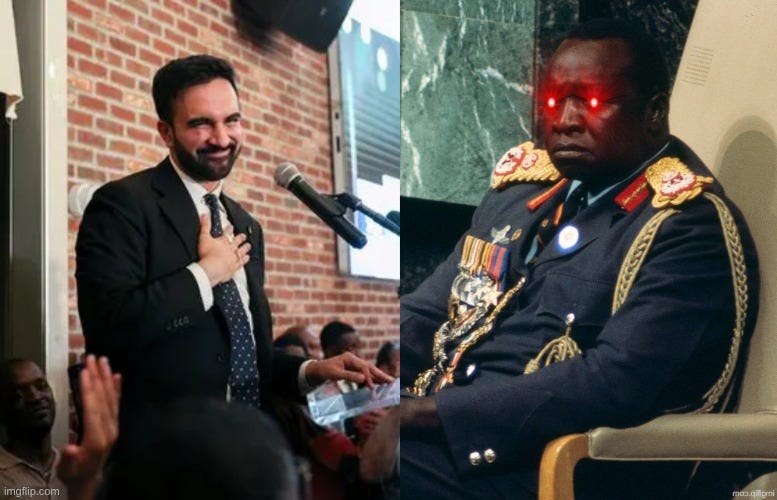
Introduction: The Man from Kampala
Following the surprise victory of Zohran Mamdani in New York City’s Democrat primary, many on the American right have learned about a form of racism hitherto unknown in American politics: that against Asian East Africans, and they are loving it. Though the identity libs are generally unwilling to admit this, increasingly obscure forms of racism are a price you pay for mass diversity, and with a relatively recently naturalized Asian Ugandan set to perhaps become Mayor of New York City, we are learning all about it. Mamdani is from a “post-Colonial background” [in both the scholarship and identity sense] and thus knows something of the subtleties of this topic, his father in fact being a major scholar on the matter and himself having a degree in African Studies. It is typical of the identitarian left to find the role of Asians in East Africa “problematic,” but when the right wing racists talk about them as a settler oppressor class I have no idea if they’re being ironic: I’m not sure if they even know anymore.
Now, I myself oppose both Mamdani’s economic and social policies, though admire his commitment to “stay in New York” as the Mayor and focus on the city instead of travelling all over the world. Further, I don’t like the idea of a guy who has only been a citizen since 2018 taking that position Yet, despite these things I find myself spending all my time defending Mamdani, because most attacks against him are ludicrous- and threats from the President to de-naturalize him are batshit insane. Many of the strongest critics of Mamdani are notable Zionists angry about his support for Palestinians rights who are calling Asian Ugandans an oppressor class, while accusing him of being simultaneously an Islamist1 and Communist [say what you will about the term “Islamofascist,” but it makes relatively more sense, a very low bar here.] Some even seem to think that notorious Ugandan dictator Idi Amin had the right idea. This is particularly ironic, because as much as I hate to compare things to Germany in the 1930’s, Amin was a raging anti-Semite who accused the Indians of being the “Jews of East Africa” and the policies which he pursued against them were nearly identical to Hitler’s policies towards the Jews immediately preceding the Holocaust. I shouldn’t complain about all of this, because I am something of an appreciator of obscure forms of racism, but I can only react with shock to the fact that some Americans appear to be just now learning about Idi Amin and then saying “Idi Amin was Right.”
Thus, for what little good it will do, I feel compelled to tell the story of East Africa’s Asians and Idi Amin, which has somehow become relevant to discourse regarding America’s most important municipal election.
Zohran Mamdani and the Post-Imperial Elite
Initially, most of the rage about Mamdani was just that Americans think New York City wasting some money on government grocery stores will cause us to all starve during a Five-Year Plan. Others are sure that Mamdani is a secret radical Islamist and believes it is virtuous to lie about it in pursuit of his goals, because somehow the minor and specific concept of taqqiya is the only thing these Americans have managed to learn about Islam in the past 25 years of terror wars and they think some Islamic scholars finding that you can lie about your faith under the threat of death is so expansive as to mean all Muslims believe you can lie in the pursuit of any goal you consider noble [also Christian theologians have debated concepts like this for 2000 years, or else there would be no theologians.] Still, others were sure that this LGBT rights activist would throw gays off the rooftops if allowed to do so, you just can’t say that and get elected in New York! Marjorie Taylor Greene, who besides hating Muslims has been cool recently, shared a picture of the Statue of Liberty covered in a full burqa. Nancy Mace approvingly retweeted it saying “A scary time for New York. Imagine telling people after 9/11 this would be the reality of their city right now.” NOW! Not even “If Mamdani wins,” but now that he has been made the Democrat nominee, the Statue of Liberty is cloaked in black fabric:
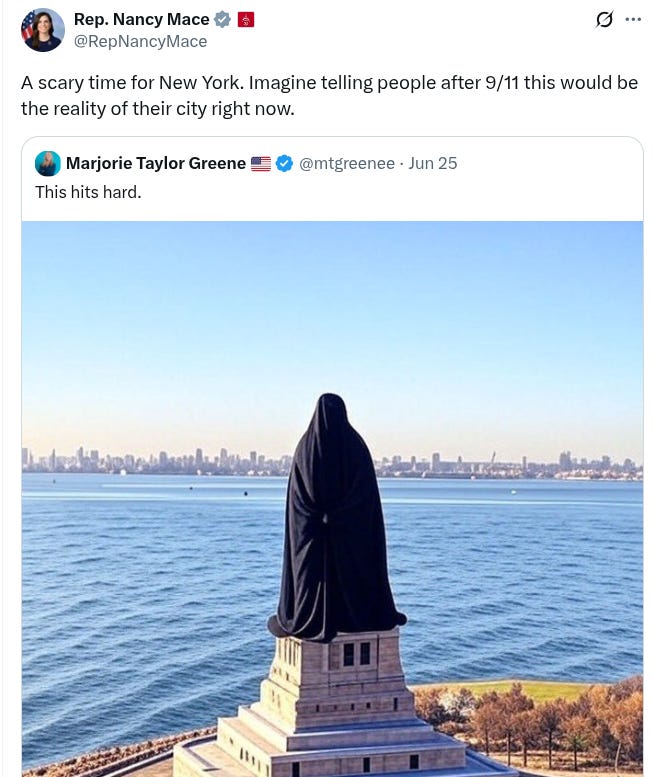
All of this despite the fact that Mamdani’s own wife, a lovely woman of Syrian descent, does not herself appear to practice hijab in any way:

I’ve seen no evidence that Mamdani even practices Islam besides him referencing breaking the Ramadan fast, and that itself may have just been food-based pandering, a major part of American politics, particularly in New York where you’re trying to appeal to like 8,000 different ethnic communities. For some reason the American mind cannot comprehend that it is possible to be an “Eid and Ramadan Muslim”- despite the fact that perhaps 40% of America’s total population are people who would be classified as Christians in Lebanon and celebrate Christmas but are not actually religious. Many asked how Mamdani can reconcile his Muslim faith with his support for gay rights, which becomes a much less interesting question when one considers that until 6 months ago the President of the United States was a practicing Catholic who has always supported legal abortion and took extremist positions in favor of gay and trans cultural issues during his Administration.
The smarter commentators were able to see that Mamdani is certainly not an Islamist and is not the Lenin type of communist and that his views come from neither Kampala nor Bombay. Instead, Mamdani is the scion of a transnational elite class cultivated in the late colonial and early post-colonial era with the intention having competent people to govern newly independent states: his views are straight out of top universities in England and the American northeast.
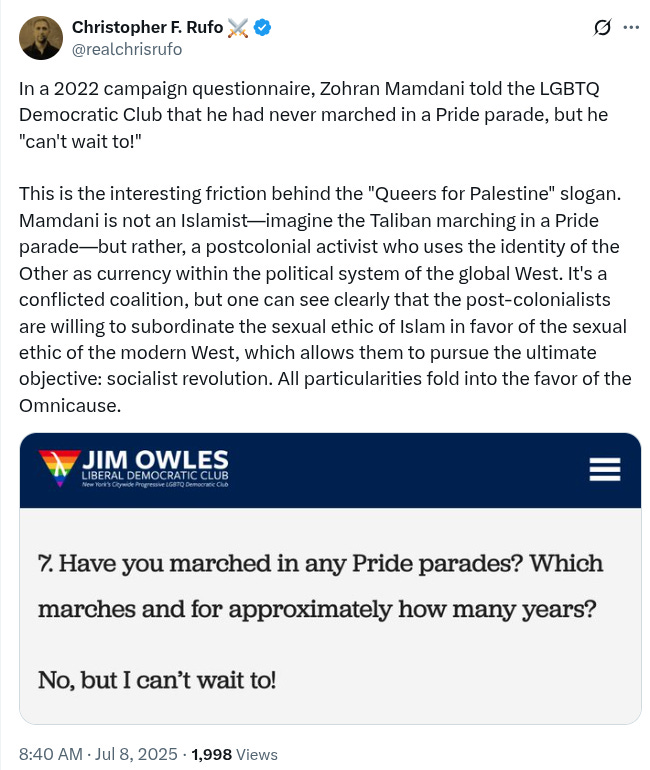
The way this played out in reality, as we have all borne witness to, is that this class largely gave up on their basket case home countries and headed for the former imperial powers where, armed with various post-Colonial theories, elite education, and programs to advance minorities, they leveraged grievance politics or anti-grievance grievance politics [looking at you, D’Souza] and began taking powerful positions in the United States and United Kingdom and giving us a bunch of condescending lectures about what our countries are supposed to be like [in fairness to Mamdani, he mostly avoids being condescending.] Americans as a whole should have this figured out, as Obama is a museum-quality specimen of this class, resulting from the marriage of an over-educated self-loathing white American lib woman and not one, but two, high education elites from formerly colonized countries. Instead of delivering “hope” and “change” he threw American race relations to hell with his combination of racialism, grievance politics, and the extreme and detached elitism of third world men with advanced degrees earned from exchange programs designed to provide their home countries with qualified pro-Anglo individuals to fill key roles, but in fact generally accomplishing just the opposite.2
That all being said, discourse about Mamdani’s background kicked into overdrive when the New York Times published a story about his college application. The entire thing is farcical: they received the hacked document from Crémieux, a Twitter use known for writing genuinely interesting threads about “race science,” and then put three people on the simple story out of fear they would be “scooped” by Chris Rufo, the anti-Affirmative Action activist at the The Manhattan Institute, who is apparently now a peer competitor of a newspaper which was once the pride of the American press. The scandal that they tried to gin up from this was that Mamdani sent out a college application listing his identity as “Asian” and “African American” Now, it is silly to say he didn’t know what he was doing as some have claimed; I don’t support this system and as far as I know he does, but we all know that the point of this is to make yourself as diverse as you can plausibly claim. He is in fact the national of an African country and “African” was missing as an option.
According to Mamdani, he wrote in “Ugandan” after selecting “Black/African American.” It does seem as if he should have selected that in ethnicity, but regardless he is correct that this does not cover his background in these boxes. It is somewhat curious he selected “Asian” instead of “South Asian” but this distinction doesn’t exist in East Africa, where they are always called “Asians” [Chinese firms there on business are just called “Chinese.”] I do whole-heartedly agree with the premise that if such a system was going to exist, it was meant to give a hand-up to the descendants of American slaves and should not have applied to a bunch of Johnny-come-latelies who lack descent from anyone who was mistreated in America. However, black African immigrants are much more successful than African Americans [sometimes called “Foundational Black Americans” for clarity, now that there is a solid African immigrant population in this country] and few would make the same criticism of the children of black African immigrants or Barack Obama for selecting the same option. Under this system, the child of Nigerian surgeons who moved here in 2000 would get all of the benefits meant for someone whose ancestors survive the Middle Passage and centuries of slavery despite that there is no reason that a Nigerian-American deserves a hand up. However, if the point is ways in which your family has been oppressed generally, It does seem like Mamdani’s father having been expelled from his country due to his race and living some of his adult life in exile would be particularly qualifying. If the point were just that diversity is an inherent good, Mamdani is as “diverse” as anyone.
Among the more courageous of Twitter commentors on this issue were those who appeared to have just learned about Asian East Africans but nevertheless chose to plow ahead inventing very strong opinions on the topic. It’s again not clear how ironic it was intended to be to say that he couldn’t ever be Ugandan- these being the same type of people going on about white genocide in South Africa and always calling Musk an African American- but there was enough commentary for it to somewhat obsess me. I don’t want to overplay the frequency because it was mostly from random accounts, but here are some examples of what we have seen:
Not that it matters, but Mamdani is a Gujarati whose paternal grandparents were born in Tanganyika. Obviously such details are of no interest to people who post shit like this on the internet. Regardless, bear in mind that Mamdani’s father Mahmood is the premier scholar on this specific subject, having written books such as “Neither Settler nor Native: The Making and Unmaking of Permanent Minorities” and is the farthest thing from oblivious about the various contradictions presented by the history of Asians in East Africa, whom at least one Twitter commentator apparently considers “bioweapons” deployed by the British. It is, in fact, more complicated than it is presented by these people who have decided to agree with Idi Amin, one of the most deranged and dimwitted tyrants in the history of post-independence Africa, categories for which there is intense competition. Further, one can be sure that most people who post things like this are “Rhodies” who would make a nearly opposite argument about the role of whites on the continent, though I must say yet again I don’t know if they even know whether or not they are being ironic at this point and if they believe this or if they are just trying to judge Mamdani by what they believe are his own values. One way or another, expelling the Asians was a disaster for Uganda, and I would have thought anyone who knew about Idi Amin believed it to be the wrong thing to do, being a key post-WW2 example where what we now call “ethnic cleansing” was a stated government policy.
Uganda and Asian East Africans
The history of Asians in East Africa is in fact much older than British colonialism, though it’s true that they were used to facilitate colonization in a variety of ways. Indians have been involved in East African trade since antiquity, along what is now known as the Swahili Coast, most of all navigating ships called Dhows between Mombasa in modern Kenya and the west coast of modern India. It is true that, as detractors of Mamdani’s heritage point out, some Indians were involved in the Indian Ocean slave trade, though by the 19th century this was largely dominated by Omanis. There happens to be a fascinating book called In An Antique Land about the life of a 12th century Indian slave owned by a Jewish merchant which gives much insight into the historic Indian Ocean trade, though they were based in what we call the Middle East, but the important part is that the scale of commerce was enormous. By the 18th century Indians were setting up permanent trade posts along Africa’s East Coast. In his 1984 book The Africans, American journalist David Lamb writes that Indians,
“Pushed into the interior on foot and in ox carts. They established small shops—an important factor in the development of East Africa—that catered to the African and later to the white settler. In many cases, the Indian merchant was the first permanent commercial or foreign contact the African villager had with the outside world. The Asian considered the African slothful and did not hesitate to exploit his ignorance for personal profit.” [154]
This is of course how merchants function generally but access to international trade is an enormous benefit; it is however also true that later the key objective of British imperialism was to profit from such trade and in this regard the Asians served them well.
Uganda is far inland and at a high elevation, and was thus isolated from international trade in a way coastal areas never were. Though its name is now nearly synonymous with grief, it is a beautiful country with all of the landscapes and peoples that captured the Western imagination of Africa.
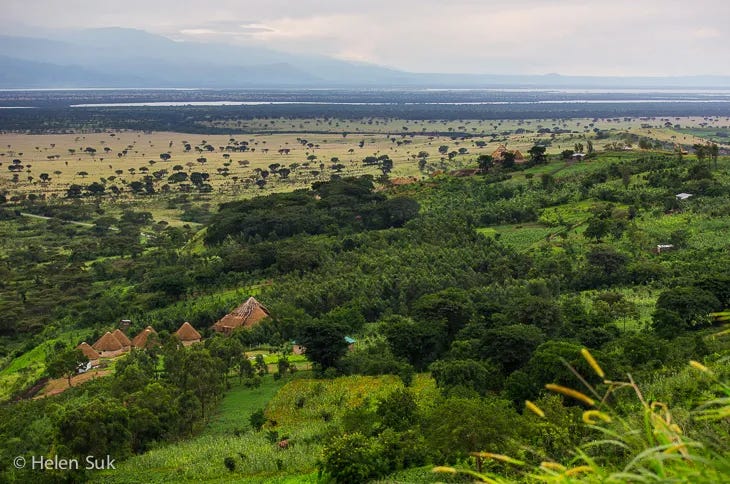
White missionaries first reached Uganda in 1854, followed by explorers such as Stanley. In the classic 1955 text Inside Africa by John Gunther, the key survey of the continent on the eve of independence, it tells how as missionaries from different sects flooded in from the 1870’s onward many Ugandans became fanatical sectarians despite having a shallow understanding of Christianity [or perhaps due to having a shallow understanding of Christianity.] According to Gunther, who it must be acknowledged is sometimes overly credulous and a bit of an apologist for the British Empire3, Buganda, the most powerful Kingdom in Uganda, after whom the country is named4, suffered under a mad king, followed by more religious sectarian conflict. In 1893 the British took over Buganda, against the will of anti-imperialists in London [where anti-imperialism was a stronger political impulse than one might think] and in 1900 they took over the rest of Uganda under the “Uganda Agreement” treaty- this added three more provinces dominated by different ethnic groups, generally seen as less developed than the Baganda. Knowing the British, we can assume they fomented a fair amount of the strife which caused the Ugandans to accept them as overlords, but regardless the narrative the Buganda Royals promoted was one of pride that they were never conquered [433-435.]
The “modern world” came into constant contact with Uganda with the construction of the Uganda Railway which began in Mombasa in 1896. These railroads were also the “seed” of the modern Asian East African population. At the time stronger anti-slavery agreements had recently been put in place so the British brought over Asian “coolies” to build the train line. Though Africans were also hired as laborers, they were considered less reliable because, among other things, being near home they had a tendency to desert, or alternately to feel unable to enter the territory of rival tribes along the rail line. Part of this story is memorably recounted in the memoir The Man-eaters of Tsavo, named after some enormous lions that kept eating railway workers [according to the text, 28 Coolies were eaten by the lions. Their skins are still at the natural history museum in Chicago.] That Asians were eaten by lions while constructing the railroad is a rather colorful example of the fact that throughout all of this Asians were also victims of colonialism.
Regarding Uganda itself, it was considered one of Britain’s happiest colonies, and having been taken over with little violence and some form of elite consent, was ruled with a soft touch; Gunther claims that as of 1955 there was no British military presence in Uganda and only 250 British police in the protectorate of over 5 million people [422.] In 1908, writing about his journeys through Africa, Winston Churchill implored the empire to concentrate on this colony, calling it “the Pearl of East Africa” and “A fairy tale” where you “climb up a railroad instead of a beanstalk, and at the top there is a wonderful new world [Lamb, 83.] He was also a great proponent of damming the source of the Nile, a project which was completed in the decade prior to independence. Churchill further described the landscape,
“I had traveled through tropical forests in Cuba and India, and had often before admire their enchanting, yet sinister, luxuriance. But the forests of Uganda, for magnificence, for variety of form and colour, for profusion of brilliant life—plant, bird, insect, reptile, beast—for the vast scale and awful fecundity of the natural processes that are beheld at work, eclipsed and indeed effaced, all previous impressions.” [Gunther, 428]
From the time the British took over in 1900, Uganda was closed to white settlement and made to remain an “African” country [which was the case of several British colonies, most notably Nigeria and Ghana.] This was perhaps not entirely altruistic, as Uganda had bad tsetse flies, and was considered unsuitable for white settlement; tsetse flies are a biting insect which both spread “sleeping sickness” in humans and a similar disease in livestock, as well as the bites agitating livestock so much that keeping them in the fly’s territory considered non-viable. However, as with the rest of British East Africa, it was opened up to Asian settlement, but the Asians lacked political rights and unlike white settlers in Kenya and Rhodesia they had little ability to pressure the British administrators. Meanwhile, with their preference towards “traditional rulers” the British left the Africans mostly under control of their own kings or chiefs and did not try to develop any sort of modern “electoral democracy” for the Africans, though they may have had village councils or votes by acclamation and that sort of thing.
The Asian population across East Africa continued to grow through the early 20th century. In 1955, Gunther gives Kenya’s population balance as 5,700,000 with 42,000 white Europeans and 158,000 Asians, primarily Indian but also Arabs, Goans, and Pakistanis [the book being written after the partition of India and Pakistan, though these populations would have arrived prior to it;] the Somalis in the “Frontier Province” were also classified as Asian, because old race science said they were not “Negroes”[314-315.]5 Gunther says that Nairobi [then a fairly new city] was “an Indian town, so much so that it looks like a suburb of Bombay” and lists the Indian names of some typical retail shops. He says they “virtually control retail trade in Kenyan cities” and that “Mombasa is even more Indian than Nairobi” and that they also control commerce in the countryside.
To hear Gunther describe Indian towns mid-century one imagines the classic one street town in the American West but with Indian shops, “Hardly a town in Kenya is without a lively, colorful line of Indian shops.” Gunther attributes their success to the same reason Asian shopkeepers and restaurateurs have been so successful in the United States: they work 7 days a week and will do business with anyone. This was critical particularly because European shopkeepers generally would not allow Africans in their businesses, and thus could run few successful businesses that didn’t rely on selling a relatively small amount of high value items. This situation is all quite similar to anti-Asian sentiment in the American West around 1900, or more recently the negative view many denizens of American ghettos had towards Korean shopkeepers in the ‘80s and ‘90s. As in LA at the time of the riots, the Africans had neither the capital to start proper retail businesses nor the experience to run them, but resented foreigners who primarily kept to themselves moving to their cities and making a living off of them. On top of all of that it needs to be added that India was the source of the cheapest manufactured goods in the British Empire [the factory conditions were, of course, appalling] and Indians had both family connections and ancient trade networks, whereas the African had no international trade partners. If an African were to get together the capital and learn the skills to run a business, he would still be buying his goods wholesale from an Indian or Omani merchant.
Asians formed the only real middle class of any size in East Africa, particularly as most British colonies had what was known as “color bar,” which is what we would call “segregation” or “Jim Crow” [though less severe than “apartheid.”] Thus, as well as running the shops, Indians did most of the skilled and professional jobs as well as the middle ranks of social service: they were lawyers, doctors, contractors, engineers, mechanics, book-keepers, and low-level bureaucrats. Gunther notes that the British could not run their colonies without Indians, something Uganda would later learn. The British despised the Indians, both racially and as economic competition, but nevertheless found them essential middle-managers in empire. Meanwhile, to the African it was Indians who took positions he aspired to, though after India’s independence the Prime Minister Nehru became the world’s most powerful anti-colonialist and sought to help Africa in various ways, such as offering scholarships in India to African students and broadcasting to Africa in Swahili to break Britain’s monopoly on access to information. Still, Gunther notes that by carrying trade into the wilderness the Indians served an “essential historical purpose” for the British, and that even when the British were still there a great many Africans resented their economic power [425.]
Asians had been in Africa in large numbers for almost a century when countries began to get their independence. David Lamb describes them as living in a “twilight zone, half citizen, half refugee, not quite belonging anywhere.” However, they had managed to accomplish what Africans had not and find a place for themselves in a system where they were discriminated against, all while facing the hostility of a new world. Though they generally opposed the British Empire, most were skeptical of African independence [it would turn out rightly so] and remained broadly loyal to the British. Asians commonly did feel Africans were slothful and financially irresponsible, and I can certainly understand why Africans found this frustrating, being as despite my historic “privilege,” I was myself quite annoyed when Vivek Ramaswamy blamed my people’s problems on watching Saved by the Bell instead of spending our whole childhood at spelling bees. It is a reality that the historic conditions in China and India have been so bad that their people tend to have an incredible capacity to work, save, and plan for the future, particularly the ones willing to strike out to a new land. Regardless, when independence came, Indians were offered the choice of a British passport [yet, not quite citizenship] or becoming a citizen of the new country and almost all of them chose Great Britain, seemingly proving the premise that they were interlopers who would never be fully African, and didn’t want to be. On the other hand, given the same choice, one imagines most Ugandans would have also opted for the UK passport. Still, Indians were in many ways integrating into these societies, Lamb interviews one Asian Kenyan who said,
“I mean, my kids’ generation can’t identify with India anymore. They don’t even care about learning the language. All our ties are to Kenya, not India. My family’s been here over a hundred years. The Asian is a tribe of Africa now.” [157]
After independence African countries took a variety of steps to “Africanize” their economies and try to promote the education and economic interests of Africans. Many of these moves attacked the economic status of Asians: Malawi cancelled their licenses to grow tobacco, Kenya confiscated thousands of shops from those who didn’t take citizenship and barred them from doing business in rural areas, and Tanzania nationalized their businesses and plantations [to be fair, this was in keeping with broader economic policies of the socialist President Nyerere.] In South Africa, Asians were second class citizens in the totalitarian Apartheid system which was too complex to go into here.6
Lamb writes of Africa’s Asians in the 1970’s,
“What seemed clear in those days was that the Asian had no future in Africa. He was an alien in a land he had helped build with sweat and ingenuity, and he lived with his bags packed, his money banked abroad, his destiny squarely in the hands of the new black authorities. He was a conspicuous, vulnerable minority that numbered nearly 1.5 million.”7 [156]
Across the eastern part of the continent Africans were concerned about what was called “the Asian problem.” Many people felt that Asian economic dominance in post-independence Africa should be reigned in, but only Uganda’s Idi Amin was crazy enough to expel them en masse.
Idi Amin: The Mad King
Though there was some instability in the 1950’s, Uganda remained one of the most peaceful and prosperous colonies in Africa. According to Gunther, in the early 50’s individual Ugandans were generally happy, but he says the country as a whole was not, because “No African country under European rule is happy, once it has reached the point of being educated enough to want freedom” [422.] This was a challenge across Africa, where the imperial goals were to develop the country and the population, but it made their rule less, not more, stable; alternately, the Portuguese didn’t have any programs to develop or educate their African subjects but were the only power willing to fight for their colonies and nevertheless lost those conflicts.8 As with other African colonies, rapidly changing sentiment within the colonies, domestic British and international anti-imperialist sentiment, and perhaps most importantly, Britain’s perpetual economic crises following two World Wars sped up the timetable for independence, which in Uganda had been leisurely, believing that quality of life would damper the movement for independence. However, the time for imperialism was up and Uganda moved towards independence along with all of the other colonies, attaining freedom in 1962.
Idi Amin, who would go on to be one of Africa’s most notorious dictators, was born in 1925, a Muslim of the small Kakwa tribe. His parents split up when he was young and his mother maintained herself by taking a series of military men as lovers. Amin joined the King’s African Rifles in 1946. An enormous, dim-witted, and poorly educated mountain man, it seems that after centuries of dealing with Scotland’s restive Highland Clans the British felt like they knew what they were getting with Amin [a Scotophile, Amin would later claim to be a descendant of the Kings of Scotland, much to the world’s amusement.] He fought for the British during the Mau Mau Rebellion, though later had a tendency of lying about his service record, claiming to have fought in India and Burma. Amin would become notorious for giving himself medals, both for real conflicts he did not participate in, as well as random things he made up entirely.
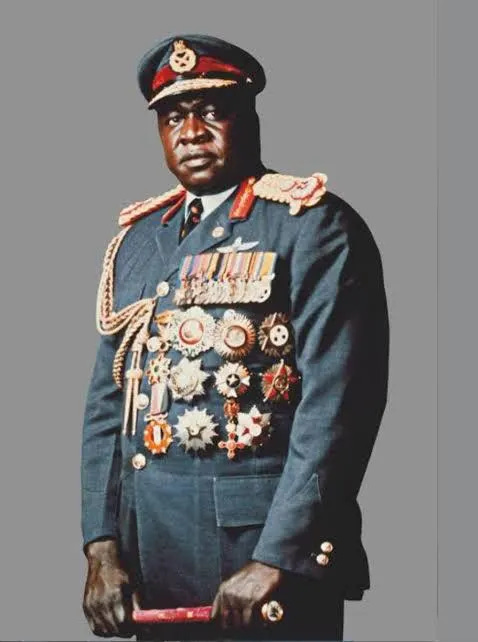
Idi Amin did, however, really have a successful career in the British military for an African of the time. Amin was seen as loyal and was a distinguished marksman as well as the national heavyweight boxing champion for 9 years. He became a Sergeant-Major, the highest rank allowed at the time. One British officer who had worked with him said, “Idi was a fine chap, though a bit short on the gray matter” [Lamb, 86.] In fact, according to Martin Meredith’s major history of the first 50 years of African independence, The Fate of Africa9, the army tried to put Amin, then in his 30’s, through special education classes which he failed to pass [231.] Amin’s tendency towards brutality was well-known to the British, having nearly got into trouble for vicious interrogation techniques in Kenya; in 1962 he was almost prosecuted for three murders committed in Kenya’s Frontier Province, but it was decided that prosecuting one of only two African army officers in Uganda in the months leading up to independence would have bad optics.
The first few years of independence in Uganda went well, with great growth in coffee, cotton, and tea exports. The first Prime Minister, Obote, had agreed to a constitution which allowed a degree of Buganda self-government, and their king was made the ceremonial Head of State. This didn’t last long, as Obote decided to change the constitution and concentrate power. Amin, by this point one of his top military officers, was sent to massacre the Buganda government, seizing the palace for his own use and sending the king into exile [233.] Obote and Amin began to see each other as rivals, each working to consolidate their own power base. In a ridiculously naive miscalculation, in 1971 Obote was travelling to a Commonwealth conference in Singapore and before leaving accused Amin and the defense minister Felix Onama of embezzling $4 million of money and weapons and asked them for a written accounting of their spending upon his return. Instead, they overthrow him in a coup which faced little resistance and Amin took over the country.
Initially, despite his leadership in massacring the Baganda, there was optimism about Amin, including from within that group. He made a variety of conciliatory gestures and was treated like a national hero. His first government was made up primarily of qualified civilians from throughout the country and he claimed military rule would be temporary. However, fearing a counter-attack he sent death squads out after Obote supporters to such an extent that truckloads of corpses were dumped in the Nile, the beginning of Uganda turning into a slaughterhouse. As with some other Presidents of similar backgrounds from this era, Amin didn’t know how governments were run and was impatient. The world as a whole was happy to portray Amin, who recorded himself diving into pools in a full suit and tie and that sort of thing, as a big buffoon and not a dangerous, potentially genocidal, tyrant. The country rapidly started falling apart and he printed money to make up for constant budget shortfalls. He also friendly with Israel but then turned on Israel and Jews generally after receiving money from Libya’s Gadaffi. Amin took this to such extremes that he expelled Uganda’s small Israeli community, praised the Munich attack on Israel’s Olympic team, and sent a 1972 telegram to the UN General Secretary saying,
“Germany is the right place where when Hitler was the Prime Minister and supreme commander, he burned over six million Jews. This is because Hitler and all German people knew that Israelis are not people who are working in the interest of the people of the world and that is why they burned the Israelis alive with gas in the soil of Germany.”
At the same time, Amin had found his own class of “Jews,” the Asians whom he claimed were parasites on Uganda’s economy and to blame for the lack of success among the African population, only 3% of whom were in regular employment [wage-earning in Africa remains ludicrously low, a major obstacle to development.] In 1971, less than a year after taking power, Amin ordered a special census where he made Asians sign documents with an inked thumb print, considered to be expressing resentment at their being the most literate group in society. Then, in September of the next year Amin gave a speech demanding that Asians with a British passport, around 2/3rds of the Asian population, or as many as 65,000 in all, leave the country immediately- he also said he would not be approving any future citizenship applications from Asians. He claimed their property and other rights would be respected, but the reality was that no one in Uganda had money to buy the businesses, and they were all going on sale at the same time, so they largely ended up selling what movable materials they could for whatever they could get and leaving with what they could carry, commonly abandoning their cars at the airport with the keys left in them. Further, due to the problem getting exit passes and planes out of the country, much of what they had packed sat at the airport for weeks or months and rotted in the rain.
The British, with characteristic understatement and feigned ignorance, tried to make it seem like none of this was that big of a deal, as you can see in either of these two news segments from 1972:
The upper video is primarily all interviews with the public, whereas the second has more information about the political situation, both in Uganda and Britain’s response. My favorite thing about this is that the British journalists keep asking why they are scared that the government has demanded that they leave and will be put in prison camps ran by the military if they don’t, and then further asks why they are scared to give an opinion on camera, under 30 years after the global public became aware of the extent of the Holocaust!
One has to admire the stoicism of the Asian population who seem to have accepted their fate and are simply trying to sell what they can and leave a country that many of them were born in and genuinely loved. However, it wouldn’t be that easy to leave. Though they had United Kingdom passports, they were not citizens as such. It seems that, in general, the British had a sort of fake optimism about how African states would govern themselves and gave Asians British passports on the belief they would not be using them to move to Britain. After Kenya passed some anti-Asian legislation, 12,000 Asian Kenyans moved to the United Kingdom, and they decided that was too many to integrate and began requiring an entrance pass, which they limited to 2,500 a year, the policy at the time Amin tried to expel them. The Asians were put in a situation of spending all day every day in lines going from office to office trying to get forms in order and affairs cared for, amidst constantly changing rules and unhelpful, hostile bureaucrats. It was not at all subtle that Amin intended to steal their property upon leaving. This is an always overused comparison, but the situation was a near direct parallel to that of Jews in Austria after the Anschluss, immediately preceding when the Holocaust is generally agreed to have begun. This passage from Vincent Sheean’s 1939 book Not Peace but a Sword provides an almost word-for-word descriptions of the situation of the Asians in Uganda as shown at the beginning of the upper video:
“Then began the long torture of preparation for escape. I never heard of anybody who was able to leave Austria after the new methods really came into operation…without an agony of many weeks, often three or four months…The difficulties were and are almost innumerable…
But if, after weeks of struggle, he succeeded in paying his taxes and still had enough money to buy a ticket to some happier country, he entered a new phase of torture. This consisted of standing in line for day after day, week after week, at the passport office…The same people went back to that line for weeks on end without ever reaching an official who could deal with their request…They had to repeat the ordeal at…the office where foreign currencies can be bought for the purposes of emigration. Here the questions asked, the proofs demanded, were ingenious, complicated and numerous….
If the passport and [currency] operations were successfully carried through, there existed no further obstacle to emigration under German law and Austrian Nazi decree..The émigré might be robbed of his money and belongings at the frontier- as happened fairly often-but at least he was legally free to get out of his stricken country and try his luck elsewhere. But before he could do so he had to obtain the visa of some country which was willing to accept him…
This was in many cases impossible, and the effort at escape ended there. [113-115]
Tanzania’s Julius Nyerere, despite that he was himself seizing Asian property, albeit with a lighter touch and more coherent ideological basis, publicly condemned the expulsion of the Asians as being like Hitler’s treatment of the Jews, while President Kuanda of Zambia called it, “terrible, horrible and abominable.” However, much of the black public of East Africa took pleasure in watching the reversal of fortune of the Asians who had for so long been a dominant merchant class [Lamb, 156.]
The Asians of Uganda would turn out to be more fortunate than the Jews of Austria, because beyond holding British passports, they had going for them that they had already been storing what money they could overseas [one of Amin’s grievances] and that Amin was much less organized than the Nazi Party and did not manage to set up a formalized system for demanding all of their money as alleged back taxes nor did he have any large number of gangs of thugs enacting extra-governmental terror. Ultimately, the British had to relent to pressure and their prior obligations, and the great majority of Asians were able to leave the country to the United Kingdom, Canada, or Australia. As it would turn out, the expelled Asians were the lucky ones.
Without the Asians, Uganda collapsed and became a horror show of violence, deprivation, and disease. Though Amin’s anti-Israel rhetoric got him assistance from some of the anti-Western countries, it didn’t do much good besides to help Amin set up his “State Research Bureau,” a particularly brutal secret police force trained by East Germany’s Stasi. Many young, educated, and enthusiastic Ugandans had supported the expulsion of the Asians believing they could move into their shops and prosper in an “Africanized” economy. The reality was that Amin gave all of the Asian businesses to his military cronies, and in many instances they simply sold the existing inventory and closed the doors. The merchants, technicians, and administrators were all gone. The factories rusted and water stopped running. Trade nearly halted and consumer products became scarce, not that people had money to buy them. It is something of a miracle the Owen Falls Dam held through Amin’s 8 years, though its power generation plummeted. Not a single hospital or school was built during Amin’s reign. In one of his many eccentric moves, he granted himself a doctorate in philosophy and named himself the chancellor of Makerere University, once the best in East Africa, and it was filled with the uneducated children of cronies and education stopped: it did not acquire a single new book from 1976-1979 [89.] The country’s celebrated wildlife was machine gunned down for meat and ivory, leaving absolute environmental devastation. The coffee and tea plantations, previously ran by Asians, went untended and filled with undergrowth that the owners previously cut and sprayed, providing nesting ground for previously controlled tsetse flies, which bred like crazy causing an outbreak of sleeping sickness in a country that no longer had doctors [264.] The expulsion of the Asians with no one to replace them caused a total collapse of Uganda, social, economic, and environmental. In Lamb’s words, Amin was, “A man obsessed with reducing Uganda to the lowest common denominator, his own” [78.]
Amin managed to maintain power for the 8 years that he did with a brutality that made him one of the most notorious dictators of the 20th century. Among the stories are that he would arrest groups of men and make themselves beat each other to death with hammers and the final survivor would be shot. People were dragged off the streets and thrown in vans never to be seen again, including judges and other such important people. Foreign journalists went missing with stories about their brutal murders surfacing. The prison, next to the French Embassy, produced such screams at night that the ambassador lodged a formal complaint and his wife had to move back to Paris to get away from them. One of Amin’s several wives was found dismembered in the trunk of a car. The Nile River became clogged with bodies. He finally went too far in 1977 when he murdered Uganda’s Anglican archbishop and two senior cabinet members, claiming they died in a car accident: the lie that he was just some affable oaf was over and pressure on Amin’s regime grew intolerable. [91.] It’s estimated that 300,000 Ugandans, or 1 in 40, died under Amin’s cruel reign [78.] Perhaps 100,000 Ugandans- anyone who could afford to- followed the Asians into exile.
In 1979, facing pressure from all quarters, Amin attempted to annex part of Tanzania. Though both sides showed themselves totally incompetent in the conflict, the Tanzanians chased Amin and his troops out of the country. He spent some time in Libya before moving to Saudi Arabia, where he lived until his death in 2003.
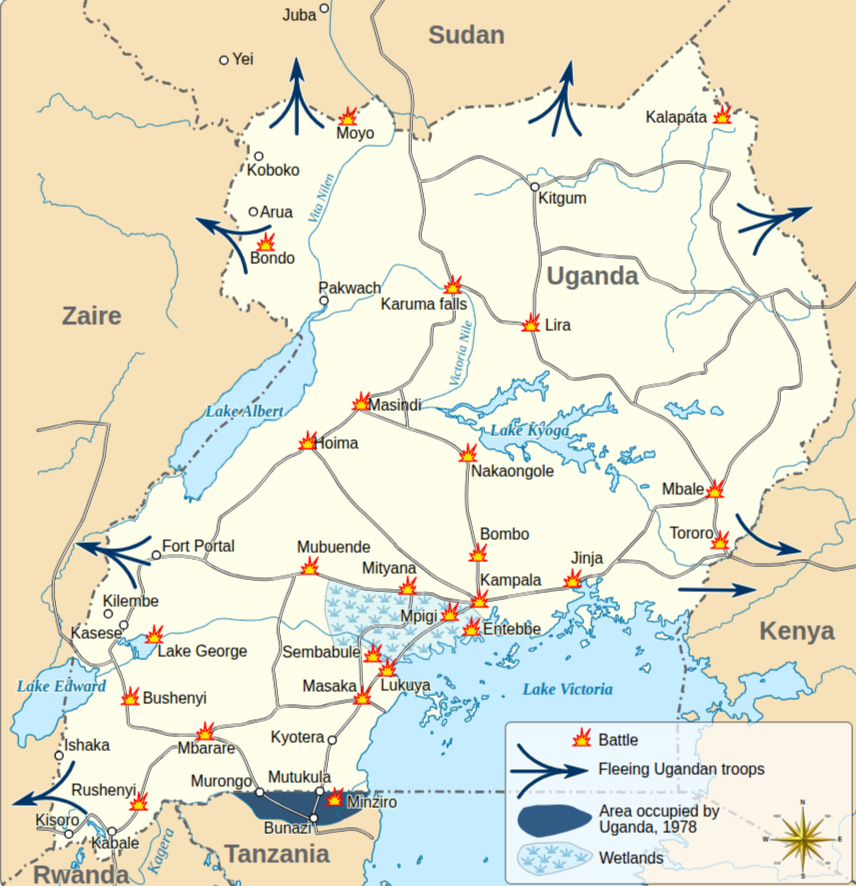
David Lamb was able to go into Amin’s modest four-bedroom home overlooking Kampala shortly after he fled the country, and said it was like “entering a hallucination,”
“His bedroom, like that of a child, was covered with pictures of military aircraft, scotch-taped to the walls. There were cartons of hand grenades under Amin’s bed and bottles for pills for venereal disease in his bureau. One closet was stacked with reels of “Tom and Jerry” cartoons, and a file cabinet was stuffed with black-and-white photos of tortured Ugandans, gaunt, maimed creatures who hardly resembled human beings at all.”
Solomon Asea, a doctor who had been Amin’s Ambassador to Washington, said,
“He had a split personality, He could kill a person one minute and the next he’d be laughing and playing the guitar and he had no recollection of what he had done. In a medical sense, he wasn’t responsible for much of what he did. He should have been a patient, not a president.” [80.]
In short, the man who set his country on the path to national suicide, the enormous mountain man, once one of the highest ranking black officers in British East Africa, was little more than a deranged child.
Unfortunately, it would be years before Uganda’s fortunes improved. The Tanzanians immediately started looting and stayed there doing so for some time. Though exiles returned to try to rebuild the country, few stayed long, as Obote soon returned to power and killed as many people as Amin in a shorter time- though in a more conventional civil war sort of fashion. By 1985 when Obote left power for a second time, Uganda was one of the poorest countries on Earth. Though it has now been largely stable for a number of years, Uganda remains a very poor country. Asians were invited back after Museveni, who is still the President, took power in 1986, and again dominate Uganda’s economy: according to one 2016 report, at the time Asians made up well under 1% of Uganda’s population but produced 65% of tax revenue. There is still some class-based resentment towards the Asian population, but the Africans seem to now understand that Asian Ugandans do indeed contribute much to Uganda.
Conclusion: Hard Times in the City
It seems likely that that Zohran Mamdani will be the next Mayor of America’s largest city. Plenty of this is his good campaigning, charisma, and a clear message. To me, the only really good things about him are that he doesn’t want to conduct foreign policy as the Mayor of New York and that he isn’t on Medicare [to be fair, Adams only becomes eligible in September.] The main reason he is likely to win is less his policies and more that he faces a split field between an incumbent with a ludicrous corruption scandal, a disgraced former governor who is a sexual harassing grandma killer, and my preferred candidate, a crazed vigilante who is most notable for being one of three people to have seemingly appeared in every documentary made about New York City in the last 40 years [the other two being Trump and Sharpton.] While the split field and New York’s corrupt, incompetent elites are probably enough to get Mamdani past the finish line regardless, there is no way you can do more to help an identity lib in a highly diverse city like New York than by ignorantly attacking him over his identity- particularly when he stuck closely to an economic “affordability” message instead of playing the “vote for a minority!” card.
The grand irony here, of course, is that no one attacking Mamdani’s heritage would actually find the role Asians played in East Africa nefarious if they bothered to learn anything about it. Still, the resentment many Africans felt towards Asians is understandable, given the economic inequality and the condescending attitude of Asians towards Africans. On the other hand, relations between merchants and their impoverished customers tend to be bad even when there is not a racial element, as one can see in any number of novels or just by talking to a convenience store or bar owner in a lower class town or neighborhood [of course, in America, plenty of those are Asians.] Much of the problem was just that the capitalist class in Uganda was too small overall, because otherwise that number of Asians, many of them small business owners, would not have dominated the economy. However, the Asians didn’t create this situation, having no political power, unlike white Rhodesians or South Africans who used political power to engineer a system of white supremacy.10 Regardless, it was nearly inevitable that with concentrated economic power, the lack of intermarriage, and low rates of socializing, majority rule would bring such problems to a wealthy and visible minority. One Asian Kenyan whom Lamb spoke to in the early 1980’s said he held the same basic view of Asians as the Africans do: “I will admit the Asians collect money almost as a hobby. We are the Jews of Africa and that’s why the Africans resent us” [157.]
What though, does any of this have to do with Mamdani or New York’s Mayoral race? One would think very little. The first thing I would advise is to not instantly believe in the prejudices or policies of some mad man from 50 years ago because you dislike a political candidate. There is also nothing hypocritical about Mamdani’s socialist positioning of himself, being as he is from an academic and artist family that have devoted their lives to studying these issues, regardless of how you feel about their conclusions. If one gives it a little bit of thought, one could perhaps even see that from experience the Mamdanis know the negative impact the concentration of wealth can have on a society and hope to avoid a bad fate for anyone.
Still, it must be said that while I don’t have anything against East Africa’s Asians, I would feel much better if Mamdani took after the ones who ran chains of grocery stores instead of believing in government-owned grocery stores. If I wanted to attack his identity it would be as a failed rapper who has barely held a job, not that he came from a class who made a great success of themselves in difficult circumstances. Mamdani may be skeptical of law enforcement, but he is the one who should know what happens when order in a society breaks down and yet may let “soft on crime” policies destroy his coming administration. He may sometimes eat rice with his hands, but he clearly isn’t some sort of uncouth third worlder who doesn’t know about silverware, it’s because he is from the transnational post-Imperial academic elite that makes a show of rejecting key aspects of Western society while being among the top beneficiaries of them.
Mamdani’s policies could cause substantial damage to New York City, and with his victory is nearly inevitable it is preferable to explain why his policies are harmful instead of launching absurd attacks on a previously obscure niche ethnic group. As for the establishment Democrats, it’s only their obliviousness to their own flagging fortunes that could cause them to avoid endorsing him instead of accepting reality and then respectfully explaining disagreements on policy matters.
No matter how much thought I give it though, I remain amazed that anyone in American in 2025 would suddenly develop prejudice specifically against Asian East Africans, even for immediate and self-serving purposes. Idi Amin was a dim-witted, deranged, violent man who resented the success of Asian East Africans and let attacking them destroy any chance his regime had. The most curious lesson from all of this is that it apparently only takes one guy winning a primary in New York to turn some Americans into Amin, even if last month they did now know there was such a thing as Asian Ugandans.
Thank you for reading! The Wayward Rabbler is written by Brad Pearce. If you enjoyed this content please subscribe and share. My main articles are free but paid subscriptions help me a huge amount. I also have a tip jar at Ko-Fi. My Facebook page is The Wayward Rabbler. You can see my shitposting and serious commentary on Twitter @WaywardRabbler.
It is apparently hopeless trying to explain this, but most Islamists, which Mamdani is certainly not one of, are more like Clericalists in Latin American politics than they are like Al Qaeda. As a point of interest, given that Eric Adams is allegedly bought off by the Turks, a country which has legitimately become more Islamist over the last 25 years of Erdogan’s rule, if anyone in this race is working for Islamists it is not Mamdani.
A key contemporary text on this is William Lederer’s “A Nation of Sheep” from 1960, which explains the various ways in which this practice was failing to win over these countries, such as sending Indians to study cotton production at universities in the American South without support during the Jim Crow era.
His first wife, Frances, was an anti-British fanatic to the extent that she kept threatening to move to Germany and join the Nazi Party, despite being Jewish; she harangued him half to death trying to make his earlier works more anti-British, but they had been divorced for over a decade by the time this text was written.
In Bantu languages the root words are generally modified by a prefix, with Buganda being the name of the kingdom, Muganda being the denonym of a resident, and Baganda being the plural of Muganda, et cetera. I have attempted to be accurate but am not a linguist.
It’s an amusing aspect of this text that he clearly considers these classifications insufficient and obsolete but thinks they are necessary for his 1950’s readers. Somalis are a “Hamitic race” based on this old classification system; it was previously believed that Somalis came from either southern Ethiopia or the Arabian Peninsula around 1000 AD, though newer research has found they are indigenous to Somaliland and thus were presumably the ones living in “the Land of Punt” and trading with the ancient Egyptians.
Though it must be noted that a different group of Asian descent, “Cape Coloreds,” a mixed-race population primarily originating from Malay slaves brought in centuries earlier, were classified separately from a more recent South Asian population. Cape Coloreds were originally allowed to vote, a right withdrawn when the Nationalists implement Apartheid.
This is somewhat misleading as 1 million of those were in South Africa, where they were under white rule and discrimination against them was rigidly formalized and stable.
Technically those colonies were considered integral parts of the Portuguese state and those wars were not fought to their military conclusions, the quagmire undermined the dictatorship which fell in a military coup and the new government immediately began negotiating independence.
Later updated editions of this book have the title changed to The State of Africa, presumably to be less pessimistic.
I know this term feels overused and spent in all contexts, but it is obviously the accurate way to describe those regimes.



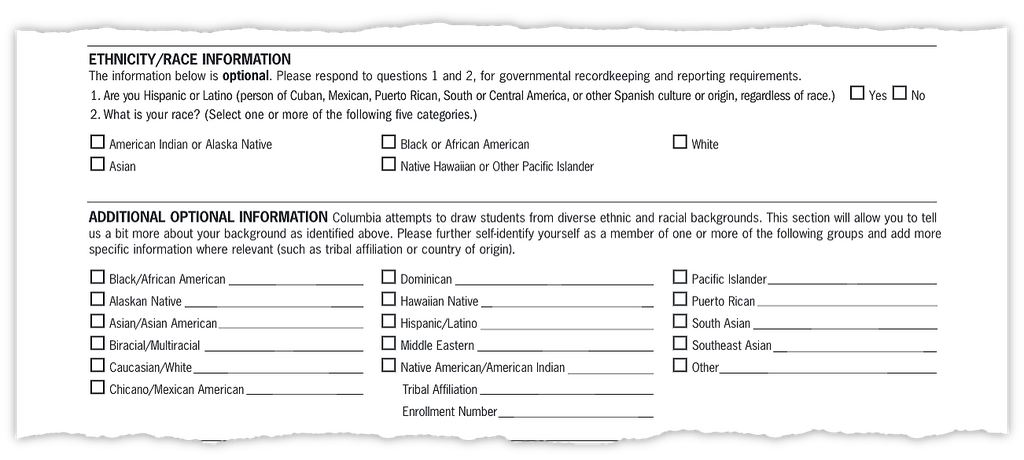

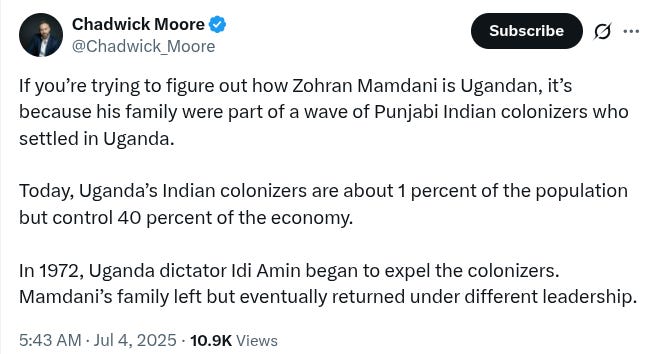



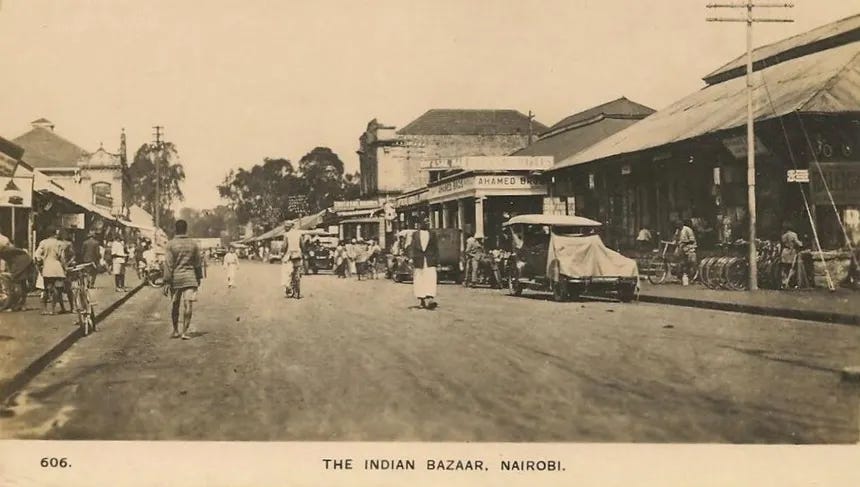
Excellent article, and I was particularly interested int the history of Idi Amin. I guess you could say I crossed paths with him once. In my wayward youth, while backpacking my way through a good-sized chunk of Africa in 1978, I happened to be in Nairobi during Jomo Kenyatta's funeral. Naturally there were many notables in town for the event. A friend announced at the local youth hostel that Amin was staying at the Nairobi Hilton. We rushed down there, cameras in hand, and joined a crowd of mostly white onlookers, hoping to catch a glimpse of the man. Keep in mind his many crimes were very well-known by then. Sure enough, he strode through the lobby with his huge white bodyguards and identically dressed little boy, waving to the crowd, looking to all the world like a celebrity, cameras clicking away. I was one of them of course, but to this day the whole scene strikes me as very odd.
I've stayed away from almost all the writing on Mamdani and the situation in NYC, it's been maddening. However, this essay was fantastic. I too think he's simply too young, too inexperienced, and his policies would be bad for any city (I recently escaped SF and the SF Bay Area after spending 25 years there, I've seen what some of it does to a city) but the insanity coming from the right embarrasses me.